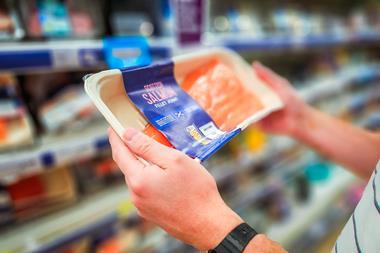n Sainsbury thinks flash pasteurisation could revolutionise food safety. Others think it may be a case of overkill, says Julian Hunt
For US shoppers, flash pasteurisation is nothing new. Almost two-thirds of the fresh beef they buy in supermarkets is treated to destroy bugs such as E.coli and salmonella. It's highly effective: beef handled in this way has 99% fewer harmful bacteria on its surface than non-pasteurised meat.
Little wonder Sainsbury is keen to build on the experience of its US subsidiary Shaw's to bring the process to this country.
Steam cleaning trials under way with Anglo Beef Processors, Sainsbury's top supplier of raw beef, are said to be going well. So well that Sainsbury microbiologist Alec Kryiakides is comfortable talking about how the work will set a new standard for the whole industry over the next two years.
But other retailers seem less convinced.
Although Tesco is keeping a close eye on what is going on in the US, its spokesman says it is more interested in ensuring the right controls are in place at the beginning of the chain, rather than developing steam cleaning at the end.
Safeway agrees: "Our produce is already processed and packed adhering to stringent hygiene regulations. We always monitor developments that could be beneficial. But the best deterrent for any bacteria remains a thorough cooking process."
Kryiakides does not argue against that. He accepts the best way to stop bugs causing harm is to ensure consumers cook their meat properly.
He also stresses that Sainsbury and its producers work under strict controls. And, he says, their meat is perfectly safe: the multiple has never found E.coli 0157 on its fresh beef and levels of other bacteria are at "extremely low levels".
In the US flash pasteurisation has been introduced as a defensive measure. E.coli has become a massive issue for the industry. And everyone is keen to do what they can to protect themselves against litigation.
With a quite different scenario here, what is the point of all this work?
Kryiakides says his company is keen to develop the concept because it will be an extra safeguard for the consumer.
Any process that ensures fewer micro-organisms are taken into the home, and so ensures there is less chance of a problem occurring, has to be a good thing.
Flash pasteurisation will, says Kryiakides, provide a "step change" in food safety. Best of all, it will be made available at no extra cost to the shopper.
If the trials with ABP go as expected, Sainsbury hopes to start using the technology as quickly as possible for all its fresh beef.
Details of how the chain will work with suppliers to roll out the process are still a bit fuzzy, as are its plans for how best to inform consumers.
But on the last point, Kryiakides does not think shoppers will be concerned that their beef has been flash pasteurised.
"It's completely natural," he says. "Everyone can relate to steam cleaning. They can relate to the fact there's nothing sinister going on."
So committed is Sainsbury to the idea, and so confident its work on fresh beef will be a success, that it hopes to start trials of similar technologies for chicken and eggs.
"The beef unit is commercial and operational, and the chicken and egg units are prototype trial units in research facilities that can be scaled up," says Kryiakides. "We hope to have more details about how these are going in February."
Meanwhile, and despite the caution of rivals, Sainsbury's efforts have already been given the thumbs up by one prominent food safety expert.
Professor Hugh Pennington says he "wholeheartedly supports" such initiatives, adding: "Used in conjunction with good farming practices, steam pasteurisation is a significant leap forward in food technology and great news for UK consumers."
{{NEWS }}
Close menu
- Home
- Retail & Wholesale
-
Products & Suppliers
- Back to parent navigation item
- Products & Suppliers
-
Product Categories:
- Back to parent navigation item
- Product Categories:
- Alcoholic drinks
- Bakery
- Cereals & breakfast
- Cheese
- Chicken & poultry
- Chocolate
- Confectionery
- Crisps, nuts & snacks
- Dairy
- Fish
- Fresh produce
- Frozen
- Household
- Meat
- Own Label
- Sauces & condiments
- Seasonal
- Soft drinks
- Vaping
- Vegan & plant-based
- World foods
- Suppliers
- People
- Reports & Data
-
Topics A-Z
- Back to parent navigation item
- Topics A-Z
-
Popular topics:
- Back to parent navigation item
- Popular topics:
- Cost of living crisis
- Crime
- Deposit Return Schemes
- Finance
- Government & Regulation
- Health
- Inflation
- Loyalty
- Marketing
- Mergers & Acquisitions
- New Product Development
- Sourcing
- Supply chain
- Sustainability & environment
- Technology
- Ultra Processed Foods
- Vaping
- A-Z all topics
- Content by type:
- Events
- Ask iA (beta)
- Subscribe now
Sign in to comment on this article
Not logged in before? Register for FREE guest access today.
You will be able to:
- Read more stories
- Receive daily newsletters
- Comment on stories
Advert



















No comments yet